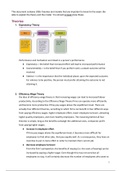This document contains (OB)- theories and models that are important to know for the exam. Be
able to explain the theory and the model. You should at least know these.
Theories
1. Expectancy Theory
Performance and motivation are linked in a person’s performance.
● Expectancy = the belief that increased effort will lead to increased performance
● Instrumentality = is the belief that if you perform well, a valued outcome will be
received.
● Valence = is the importance that the individual places upon the expected outcome.
For valence to be positive, the person must prefer attaining the outcome to not
attaining it.
2. Efficiency Wage Theory
the idea of efficiency wage theory is that increasing wages can lead to increased labour
productivity. According to the Efficiency Wage Theory firms can operate more efficiently
and become more productive if they pay wages above the equilibrium level. There are
actually four different theories, according to which firms can benefit in four different ways
from paying efficiency wages: higher employee effort, lower employee turnover, attracting
higher quality employees, and more healthy employees. The reasoning behind all four
theories is simple, long as the benefits outweigh the additional costs, companies profit
from paying higher wages.
● increase in employee effort
If firms pay wages above the equilibrium level, it becomes more difficult for
employees to find other jobs, that pay equally well. As a consequence, they have an
incentive to put in more effort in order to maintain their current job.
● decrease employee turnover
From the firm’s perspective, the benefits of staying (i.e. the costs of leaving) can be
increased by paying a higher wage. Even though this may not convince all
employees to stay, it will certainly decrease the number of employees who want to
1
, leave the firm. This benefits the company, because employee turnovers are costly.
The process of hiring and training new employees takes up valuable time and
resources and thus increases production costs
● increase in employee quality
This results in a self-selection process if we assume that higher quality workers only
apply to jobs that pay above the equilibrium level, whereas low-quality workers will
gladly work for equilibrium wages. Thus, to attract high-quality employees, firms
have to offer efficiency wages
● increase in employee health
Employers benefits from an increase in employee health because healthy
employees are more productive than workers who are frail in health. In addition,
they are less on sick leave and their healthcare costs are lower.
3. Psychological Contract Theory
Represents the mutual beliefs, perceptions and informal obligations between an employer
and an employee. It sets the dynamics for the relationship and defines the detailed
practicality of the work to be done. It is distinguishable from the formal written contract of
employment which, for the most part, only identifies mutual duties and responsibilities in a
generalized form.
Relationship between employee and
employer more complex than as described
in formal contracts.
core notions:
○ Psychological contract > legal
contract
○ expectations and obligations
○ violations: small and large
2





